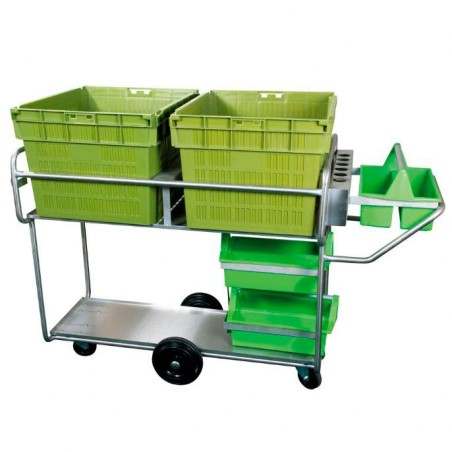Folic acid plays a crucial role in protein deposition and tissue synthesis and rapidly growing tissues with a high turnover rate are sensitive to its levels. Often, nursery diets include 6 to 10 times the recommended dietary supplementation of folic acid to prevent a deficiency caused due to its instability and insufficient daily feed intake. Supplementation of high levels of folic acid improved growth performance of weaned piglets in previous reports. However, in a post-weaning diet lacking antibiotics and zinc oxide, the effect of folic acid on the growth performance and underlying mechanism on the intestinal morphology and functions in weaned piglets are still unclear. The present study was conducted to evaluate the effect of dietary folic acid on the growth performance, intestinal morphology, and intestinal epithelial cells renewal in post-weaning piglets. Twenty-eight piglets (weaned at day 21, initial body weight of 6.73 ± 0.62 kg) were randomly allotted to 4 treatments with 7 pens per diet and 1 piglet per pen. The piglets were fed the same antibiotic-free and zinc oxide-free basal diets supplemented with folic acid at 0, 3, 9, and 18 mg/kg for 14 days.
The results showed that dietary supplementation with folic acid linearly increased villus height (VH), VH-to-crypt depth (VH:CD) ratio and villus surface area (VSA). The analyzed parameters ADG, serum urea nitrogen (BUN) content, VH, VSA, and serum folate (SF) concentration responded linearly to the dietary folic acid concentration when the dietary folic acid concentration was below 4.42, 5.26, 4.79, 3.47, and 3.53 mg/kg respectively, as assessed by a two-linear broken-line regression. Above these breakpoints, the response of ADG, VH, VSA, and SF plateaued in response to changes in dietary folic acid concentration. Moreover, dietary supplementation with folic acid significantly increased the lactase and sucrase activities in the jejunal mucosa of weaned piglets. The mRNA expression of solute carrier family 6 member 19 (SLC6a19), solute carrier family 1 member 1 (SLC7a1), tumor necrosis factor-α (TNF-α), the number of Ki67 positive cells, and cell shedding rate had a significant linear contrast in dietary folic acid groups.

In conclusion, these results indicate that folic acid supplementation can improve the growth performance and intestinal morphology of weaned piglets by maintaining the balance of epithelial cell renewal.
Wang L, Tan X, Wang H, Wang Q, Huang P, Li Y, Li J, Huang J, Yang H, Yin Y. Effects of varying dietary folic acid during weaning stress of piglets. Animal Nutrition. 2021; 7(1): 101-110. https://doi.org/10.1016/j.aninu.2020.12.002




